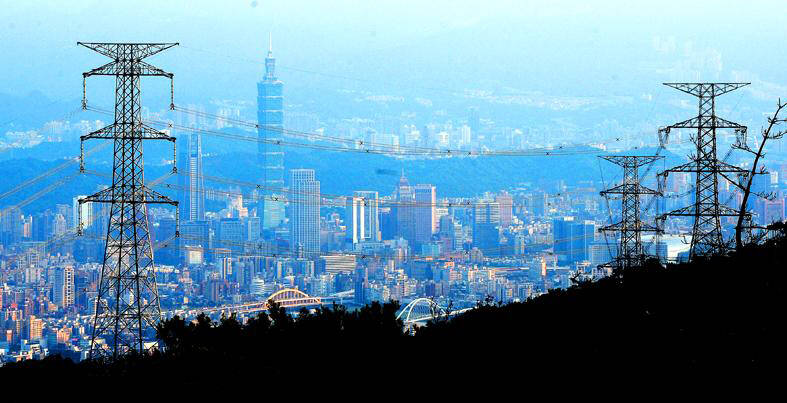Minister of Environment Peng Chi-ming (彭啟明) on Thursday compared the government’s stated goal to achieve net zero emissions by 2050 to a “moon landing,” suggesting that Taiwan should “rethink” its strategy.
“I must say that [the bid to achieve] net zero emissions by 2050 is like the moon landing” in the 1960s, Peng said of the blueprint put forward by the government in 2022 at a news conference shortly after the National Climate Change Response Committee convened for the first time earlier in the day.
Describing such efforts as “extremely challenging,” Peng suggested that the nation should “rethink” its strategy about reducing carbon emissions.

Photo: Lin Cheng-kun, Taipei Times
Meanwhile, Presidential Office spokesman Xavier Chang (張惇涵) said that members of the committee had “constructive and comprehensive” discussions during the four-hour meeting.
The committee members agreed that Taiwan should develop renewable energy and that the government should establish a platform to disclose information on different energy sources, he said.
On nuclear policy, Chang cited President William Lai (賴清德) as saying in the discussions that to the government, “societal consensus” on how to ensure safety and deal with nuclear waste remains crucial.
Lai said that under that premise, the government was open to nuclear energy options.
In his opening remarks, Lai also said that the energy issue has never been simple and binary, and it requires society to “confront problems with honesty” and “come up with practical solutions.”
A “nuclear-free homeland” is not an ideological issue unique to the Democratic Progressive Party, Lai said before the committee convened.
He added that phasing out nuclear power was already codified in the Basic Environment Act (環境基本法) adopted by the legislature in 2002, at a time when the DPP was a minority.
The National Climate Change Response Committee is one of the three committees that Lai established under the Presidential Office in June.
Lai presides over the ad hoc group with Vice Premier Cheng Li-chiun (鄭麗君), Academia Sinica President James Liao (廖俊智) and Pegatron Corp chairman Tung Tzu-hsien (童子賢) also on the committee as deputy conveners.

Beijing could eventually see a full amphibious invasion of Taiwan as the only "prudent" way to bring about unification, the US Department of Defense said in a newly released annual report to Congress. The Pentagon's "Annual Report to Congress: Military and Security Developments Involving the People's Republic of China 2025," was in many ways similar to last year’s report but reorganized the analysis of the options China has to take over Taiwan. Generally, according to the report, Chinese leaders view the People's Liberation Army's (PLA) capabilities for a Taiwan campaign as improving, but they remain uncertain about its readiness to successfully seize

Taiwan is getting a day off on Christmas for the first time in 25 years. The change comes after opposition parties passed a law earlier this year to add or restore five public holidays, including Constitution Day, which falls on today, Dec. 25. The day marks the 1947 adoption of the constitution of the Republic of China, as the government in Taipei is formally known. Back then the Chinese Nationalist Party (KMT) governed China from Nanjing. When the KMT, now an opposition party in Taiwan, passed the legislation on holidays, it said that they would help “commemorate the history of national development.” That

HORROR STORIES: One victim recounted not realizing they had been stabbed and seeing people bleeding, while another recalled breaking down in tears after fleeing A man on Friday died after he tried to fight the knife-wielding suspect who went on a stabbing spree near two of Taipei’s busiest metro stations, Taipei Mayor Chiang Wan-an (蔣萬安) said. The 57-year-old man, identified by his family name, Yu (余), encountered the suspect at Exit M7 of Taipei Main Station and immediately tried to stop him, but was fatally wounded and later died, Chiang said, calling the incident “heartbreaking.” Yu’s family would receive at least NT$5 million (US$158,584) in compensation through the Taipei Rapid Transit Corp’s (TRTC) insurance coverage, he said after convening an emergency security response meeting yesterday morning. National

Taiwan has overtaken South Korea this year in per capita income for the first time in 23 years, IMF data showed. Per capita income is a nation’s GDP divided by the total population, used to compare average wealth levels across countries. Taiwan also beat Japan this year on per capita income, after surpassing it for the first time last year, US magazine Newsweek reported yesterday. Across Asia, Taiwan ranked fourth for per capita income at US$37,827 this year due to sustained economic growth, the report said. In the top three spots were Singapore, Macau and Hong Kong, it said. South